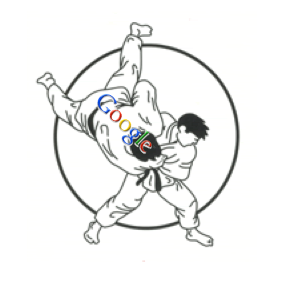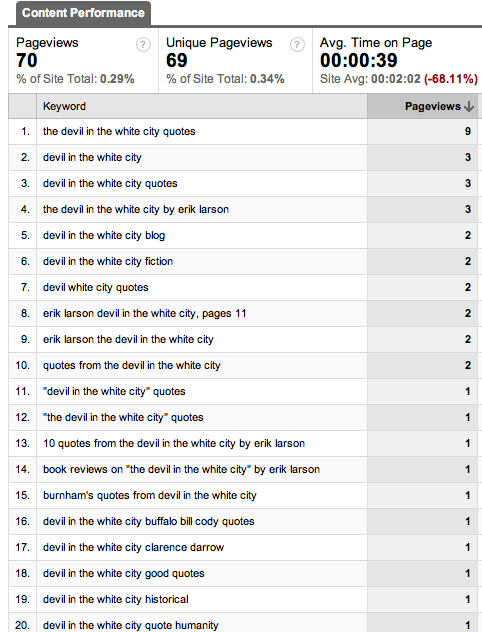
SEO Judo is used when you have a site or blog with content that hasn’t been optimized for search. When content isn’t created with keyword research as part of the process Google and other search engines define the relevant keywords for each page.
That’s where SEO Judo comes in handy.
What is SEO Judo?
First, let’s start with the meaning of Judo.
… it is the principle of using one’s opponent’s strength against him and adapting well to changing circumstances.
In the world of SEO the opponent is Google. Don’t misunderstand, Google isn’t evil. I don’t believe that Google has ulterior motives to each and every algorithm change. That’s not what I mean by opponent.
Instead I simply mean that when Google decides what a page is about it’s pretty difficult to change it’s mind. And the longer Google thinks a page is about a certain cluster of keywords the tougher it’ll be to convince Google otherwise.
Use Google’s Strength
Why fight Google? Instead, use their strength against them. If Google thinks a page is about a certain keyword and you’re currently ranked 5th for that term go ahead and optimize the page for that term and see if you can increase your rank and claim a greater amount of that traffic.
Sure you might look at the page and think that another keyword would be better, or you may look at a root keyword and get big saucer eyes with the amount of traffic you could get if you ranked for that term. But your opponent is strong. Very strong.
It will take a substantial effort and a fair amount of time to convince Google of new keyword targeting. Even then, you’re not guaranteed success. Instead, use SEO Judo and use Google’s momentum to reinforce what it already believes.
SEO Judo Example
Here’s an example of how to practice SEO Judo from my small Used Books Blog. In February I read and reviewed Erik Larson’s Devil and the White City. Using Google Analytics I can go and look at what keywords brought people to this page.

Even with the small volume you can quickly see a cluster of keywords around ‘devil in the white city quotes’. Performing this query on Google returns the page as the 11th result. Not bad!

In this case Google has ignored my meta description and created a snippet based on the text in the review. (More on this a bit later.) Clearly the Holy Trinity of SEO (title, meta description and URL) is not being optimized for the term ‘devil in the white city quotes’. But … it could.

With a bit of SEO Judo I can adapt to changing circumstances and use Google’s strength to my advantage. In a short amount of time I’d be a fixture on the first page for the term ‘devil in the white city quotes’.
When NOT to use SEO Judo
I wouldn’t use SEO Judo for the example I just used. Sure, I could, but to what purpose? The page doesn’t actually have any quotes from The Devil in the White City. (Thanks to the poor snippet algorithm.)
SEO isn’t just about traffic. Post Click SEO is the goal – getting the right traffic for your blog, site or business.
So only use SEO Judo if the keyword Google selects is actually good for your business. Remember, Google might be strong but it’s still not very smart.
When to use SEO Judo
SEO Judo should be used when you’ve given Google enough information to form an opinion. Google doesn’t need a whole lot, so this really means that the page must have a non-duplicative title and should have a keyword based URL.
In addition, the page must get enough SEO traffic so you can identify keyword clusters. If no one keyword phrase emerges, go back and optimize based on straight forward keyword research. If there are competing terms, you can again fall back on keyword research to select the best keyword target.
SEO Judo works best when you can create new content. Using the example above, I might change my review of Devil in the White City to include quotes, or I could create a new blog post specifically about quotes from Devil in the White City. Not only do I already understand Google’s appetite for this term, but I might finesse an indented listing by linking between the two posts.
This process is also useful if you’re pursuing a root keyword strategy. Instead of doing SEO Judo on the root keyword URL, you can use SEO Judo to create content for secondary terms that are firing on that root keyword content. This provides additional focus for the root keyword while building traffic on secondary terms.
Stop wearing yourself out trying to out-punch Google and instead use SEO Judo to throw Google to the mat.
The Next Post: Image Based Google Shopping OneBox
The Previous Post: Do AdWords Conversion Rates Vary by Position?

1 trackbacks/pingbacks
Comments About SEO Judo
// 1 comments so far.
Singapore SEO Consultant In Malaysia // September 20th 2009
Thanks for the tips but I’ll learn SEO Kung Fu instead as Chinese Kung Fu is better than Judo. 🙂
Sorry, comments for this entry are closed at this time.
You can follow any responses to this entry via its RSS comments feed.